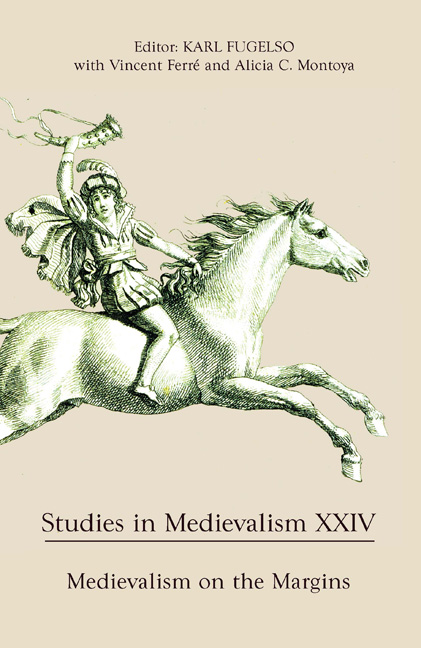Book contents
- Frontmatter
- Acknowledgments
- Contents
- List of Illustrations
- Volume XXIV 2015
- Editorial Note
- I Medievalism on the Margins: Some Perspective(s)
- 1 Medievalism in the Margins: Paratexts and the Packaging of Medieval French Literature
- 2 Medievalism Studies and the Subject of Religion
- 3 Pop Medievalism
- 4 Ecomedievalism: Applying Ecotheory to Medievalism and Neomedievalism
- 5 Whiteness and Time: The Once, Present, and Future Race
- 6 A Desire for Origins: The Marginal Robin Hood of the Later Ballads
- 7 Women, Queerness, and Massive Chalice: Medievalism in Participatory Culture
- 8 “Constant inward looking,” Medieval Devotional Literature, and the Concordium-Fruitlands Library
- II Trans-Atlantic Medievalism(s)
- III Other Interpretations
- Contributors
1 - Medievalism in the Margins: Paratexts and the Packaging of Medieval French Literature
from I - Medievalism on the Margins: Some Perspective(s)
Published online by Cambridge University Press: 05 December 2015
- Frontmatter
- Acknowledgments
- Contents
- List of Illustrations
- Volume XXIV 2015
- Editorial Note
- I Medievalism on the Margins: Some Perspective(s)
- 1 Medievalism in the Margins: Paratexts and the Packaging of Medieval French Literature
- 2 Medievalism Studies and the Subject of Religion
- 3 Pop Medievalism
- 4 Ecomedievalism: Applying Ecotheory to Medievalism and Neomedievalism
- 5 Whiteness and Time: The Once, Present, and Future Race
- 6 A Desire for Origins: The Marginal Robin Hood of the Later Ballads
- 7 Women, Queerness, and Massive Chalice: Medievalism in Participatory Culture
- 8 “Constant inward looking,” Medieval Devotional Literature, and the Concordium-Fruitlands Library
- II Trans-Atlantic Medievalism(s)
- III Other Interpretations
- Contributors
Summary
In the current academic milieu […] medieval studies is a marginalized institution. Most literary scholars and critics consider medieval texts to be utterly extraneous to their own interests, as at best irrelevant, at worst inconsequential; and they perceive the field itself as a site of pedantry and antiquarianism, a place to escape from the demands of modern intellectual life.
Lee Patterson, “On the Margin: Postmodernism, Ironic History, and Medieval Studies”In 1990 Lee Patterson lamented the marginalization of medieval studies, urging colleagues to emphasize its social relevance. Twenty-five years later medievalism – the study of the medieval period and its reception – still hovers at the periphery of academia. This essay proposes that the scholarly use of paratexts in editions of medieval literature has played a major role in this marginalization.
The decisions made in publishing editions or excerpts of medieval works are a form of medievalism, revealing what particular editors think about the Middle Ages. What kinds of medieval texts are considered important and for what reasons? How are they reproduced (in their original language and form; in translation)? How are they classified for students? How have such choices been influenced by tradition? In the French context the answers to many of these questions can be found in the prefaces, introductions, footnotes, and tables of contents that have guided the reception of medieval texts from the nineteenth century – when anthologies of French literature began including medieval works – until now.
Paratexts, as Gérard Genette has noted, are not anodyne. They function as “thresholds” that open doors to readers. Like Philippe Lejeune, Genette represents the paratext as “a fringe of the printed text which in reality controls one's whole reading of the text.” Tables of contents, prefaces, and marginal notes are “the privileged place of a pragmatics and a strategy” that profoundly influences readers. Given the challenges of interpreting old and middle French, this “fringe” exerts a disproportionate influence.
- Type
- Chapter
- Information
- Studies in Medievalism XXIVMedievalism on the Margins, pp. 1 - 10Publisher: Boydell & BrewerPrint publication year: 2015



